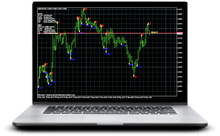Market Index
Market Index
The price of a stock on the market carries crucial information. It allows us to determine the market value of a company's business. By multiplying the number of shares of a particular company by its value, we get the market capitalization or value of the business. We buy a business if we buy all or almost all of the stock. Meanwhile, a unique indicator called an index is used to estimate the market's overall movement.
What is the market index?
It is often not enough to know the market capitalization of one or even several companies. Investors are often faced with the question - where exactly is the market moving as a whole?
Market indices - the average value of a certain number of shares included in the index - help to answer this question. The index's growth will mean that most of the stocks included in the index are most likely rising, i.e., the market is growing. A decrease in the index, on the other hand, would mean a drop in the average value, i.e., a market decline.
The index is a dimensionless value that is measured in points.
How does the market index work? Major stock indexes.
Indices are calculated automatically by various companies-operators (for example, Standard & Poor's) on a specific pool of assets traded on multiple exchanges.
Those assets on which the index is calculated are called its base. Sometimes a number is specified after the index name, for example, S&P500. This number means the number of stocks in the base.
Here are some examples of stock market indexes:
|
Index |
Ticker on FBS |
Country |
Market |
|
Dow Jones |
US |
New-York Stock Exchange (NYSE) |
|
|
S&P500 |
US |
NYSE+NASDAQ |
|
|
NASDAQ 100 |
US |
NASDAQ |
|
|
DAX30 |
Germany |
Börse Frankfurt |
|
|
FTSE100 |
UK |
London Stock Exchange (LSE) |
|
|
CAC40 |
France |
Euronext Paris |
|
|
Nikkei225 |
Japan |
Tokyo Stock Exchange (TSE) |
|
|
EuroStoxx50 |
EU |
EUREX |
Types of market indexes
There are several ways to calculate the index:
Price-weighted average
The calculation is made by adding stock prices and dividing them by a particular "divisor". This is how the Dow Jones index, for example, is calculated.
Market value-weighted index
This calculation method involves calculating some weighted average return for each stock in the index. This approach is used, for example, to calculate the S&P500 and NASDAQ indices.
Equally weighted index
This calculation is based on a simple arithmetic average.
Use of market indexes
With the help of global market indices, traders can trade not just one stock but the whole market at once. In this case, traders usually trade index derivatives: futures, options, CFDs, or, for example, using Exchange Traded Funds (ETFs). On the FBS platform, traders can trade CFDs on 11 different indices.
Some traders can compile index portfolios by copying an index when investing. For example, you can copy the classic Dow Jones index if you buy all 30 stocks.
Market indexes as benchmarks
Market indices often act as indicators of what is happening in the economy.
The major US stock indices, S&P, NASDAQ, and Dow Jones serve as a benchmark of the situation in the stock markets.
The benchmark of commodity markets is the S&P GSCI, developed in 1991 by Goldman Sachs and tracking the price changes for 24 commodities from all sectors. In addition, the Bloomberg Commodity Index (BCOM) is also popular.
The currency market benchmark, often called the Basic Dollar Index (DXY), tracks a basket of 6 currencies from developed countries: EUR, JPY, GBP, CAD, SEK, and CHF.
There are more specific benchmark indexes, e.g., the Baltic Dry Index (BDI), which measures the cost of shipping dry cargo by sea along twenty trade routes. The BDI is an excellent predictor of commodity prices. An increase in the BDI usually indicates an increase in demand.
Also, as a benchmark, you may find the market futures index, total bond market index, and emerging market index.
Major stock indexes. Which US stock market indexes are most widely quoted?
Due to high liquidity, the key American indices: S&P500, NASDAQ, and the classic Dow Jones, are the market benchmarks by right. Learn how to trade the most famous stock indexes.
Traders all over the world closely follow the changes in these indices and their differences can have a significant impact on the movements of other stock markets.
The undisputed leader in terms of citations and recognition is the Dow Jones index, first published in The Wall Street Journal newspaper in 1896.
Knowing how stock indices are calculated and work can help you in your trading. You can always find other helpful market information by going to trading platforms.
Disclaimer: This is for informational purposes only and do not contain - or to be considered as containing - investment advice, suggestion or recommendation for trading.
2023-05-12 • Updated











